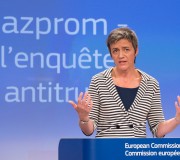These have been busy weeks for the Directorate General for Competition, the almighty European market regulator. Spurred by its iron fisted Commissioner, Margrethe Vestager, on the 15th and 22nd of April, the European Commission decided to take action against Google and Gazprom, over allegations of having abused their dominant position on the market. These decisions are without prejudice of the outcome of the investigation, but the two firms may face fines up to 10 % of their turnover, amounting to billions of euros.
DG COMP: the world’s most powerful competition authority
Competition policy is one of the few competences exclusively exercised by the Commission – the Member States keeping their own competition authorities for issues relevant to their own national market – making the DG COMP the world’s most powerful competition authority. European competition law does not condemn the dominant position one can acquire through fair competition, innovation and the better quality of your products. It aims at protecting the consumer by keeping big firms from using their power to strengthen their position and eliminate competition, in order to favour their products or services and charge higher prices on the market.
After having conducted a 5-year investigation, the Commission believes Google has exploited its dominance in the online search engine market- it currently holds 90 % of this market in Europe – to prioritise its own comparison shopping product over the ones of its competitors. Basically, a consumer searching for a comparison between products on Google would be more likely to be redirected to Google’s own comparison system than to the ones of its competitors, regardless of how appropriate Google’s service is to the request of the user. Google would be using its strength on the search engine market to gain power on other markets, stifling competition and ultimately harming consumers. Having been a key actor for innovation in the last decades, Google is now suspected to unlawfully protect itself from potential competitors.
In the Gazprom case, the potentially illegal behaviour is more obvious. The Commission is investigating anti-competitive practices in Central and Eastern Europe. Given that Gazprom is a vital supplier of gas for many EU Member States, it enjoys a huge bargaining power that he may have used to limit cross-border competition and impose higher prices to consumers.
The United States and Russia quickly denounced the Commission decisions as politically motivated. Commentators have also pointed that the Commission might have acted to cover its own weaknesses on the digital and the energy market, two markets that happen to be the priorities of the Juncker mandate. There is some truth lying in these criticisms. As long as a foreign actor is capable of offering better or cheaper products to European consumers, it should be welcomed. Google, a company that has been fostering innovation in many markets ought not to be punished for its success. Competition regulation should remain primarily a legal tool and should not be twisted to serve any protectionist agenda.
Nonetheless, together with the law goes the way to enforce it. The Commission has a political role in setting up priorities and approaches in the way it implements its rules. To that extent, the Commission steadiness is important, for it has often been argued that Europe was unable to protect itself. The Union should use this opportunity to show that it is working for the sake of its citizens and is ready to use its strength to protect them. As the world’s strongest consumer market, the EU has the capacity to face the world’s biggest companies, a capacity that none of its member states enjoys alone.
It goes with the essence of the European project and its credibility
The final outcome of the investigations is not known yet and the Commission will have the possibility to settle an agreement with the parties. But the European Union has just shown that it was ready to act according to its rules when the interest of its citizens was threatened, no matter how big the adversary was. It is consistent with the vision the European Democrats have always defended, of a strong and protective Europe in globalization. It is crucial, because it goes with the essence of the European project and its credibility.
These developments are a vital reminder of how Europe can stand in a globalized world. United, it has the capacity to make its voice heard, divided it is bound to be an addition of small entities, struggling in front of tomorrow’s giants.
Vincent Delhomme (@VincentDelhomme)
(Photo: European Commission)


